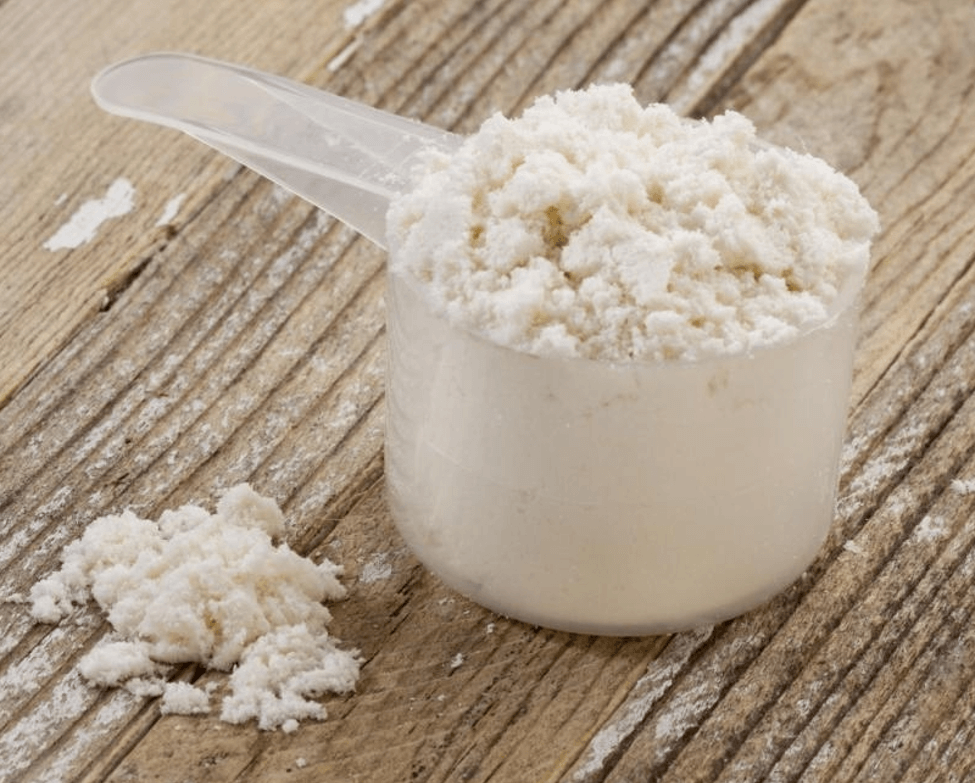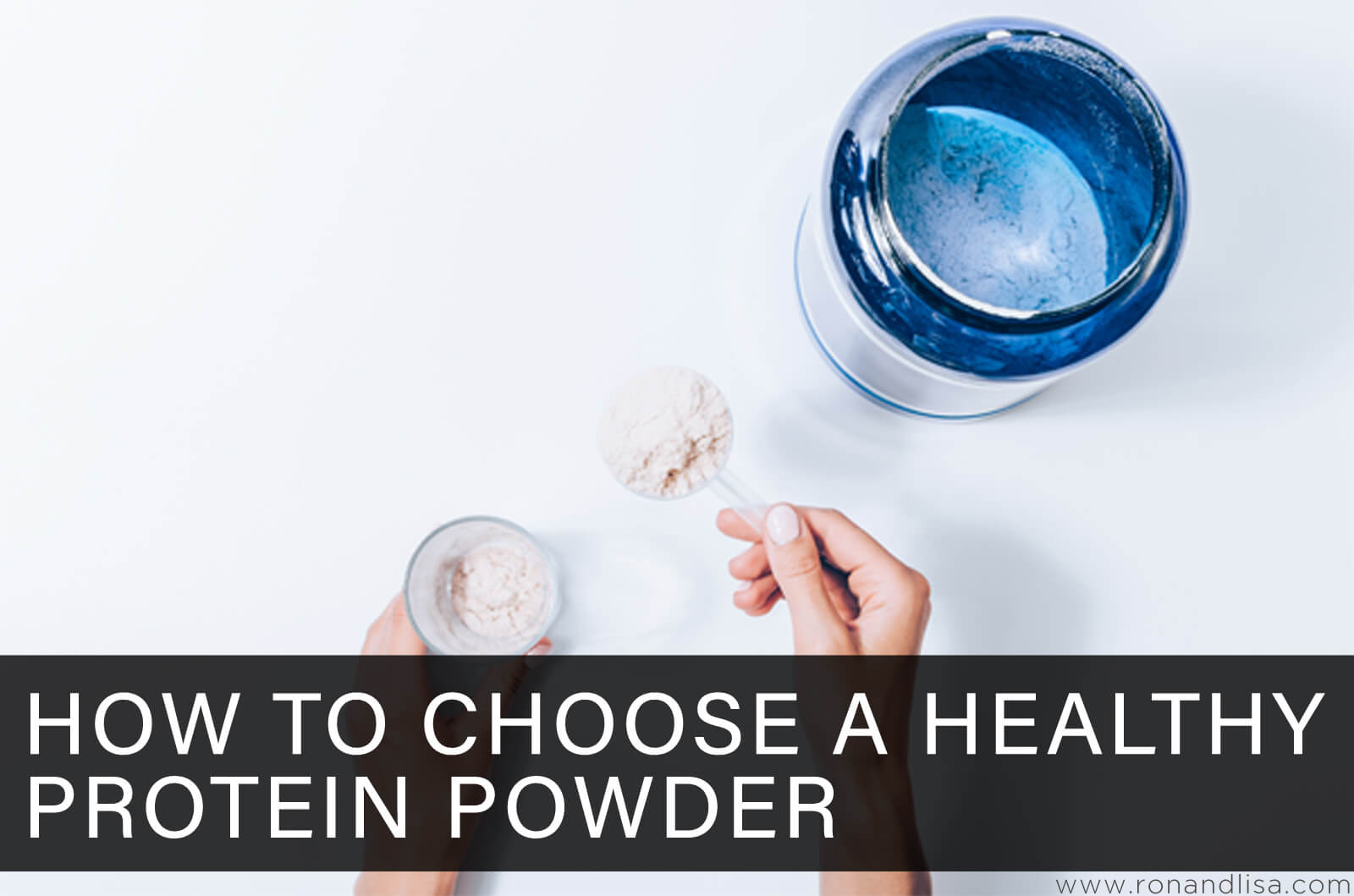Choosing a protein powder can be a confusing process. There are so many different types and brands of protein, with different flavors and tempting additives. It can take a while to find one that tastes good, digests easily, and doesn’t break the bank. It’s even more difficult to sift through all of the protein powders on the market to find the ones with the best ingredients.
Once you decide the best type of protein for your needs, it’s really important to spend time choosing the cleanest and healthiest protein powder. Many products contain a laundry list of unnecessary ingredients that could possibly do more harm than good. Some common additives come with appealing claims that actually have no science behind them at all.
If you’re on the hunt for a new protein powder, or you’re not sure if the one you’re using is the cleanest option, it’s time to take a closer look. Use this guide if you’re not sure where to start.
Why use protein powder?
First, think about why you’re using protein powder. Most people consume enough protein from food, so knowing if you truly need a protein supplement and how it can benefit your goals will help you choose the best type. Some common reasons to use protein powder include:
- To build muscle mass
- To lose weight
- To improve athletic performance
- To optimize general nutrition
- For recovery after surgery
It’s simple for most people to get enough protein from foods. However, protein powder is usually more convenient than protein from food because it is portable and easy to prepare. It’s nice to easily throw a shake together on busy days. Protein powder is also absorbed more quickly, which may help build lean muscle mass in combination with weight training.
Choose the best type of protein powder for your goals
Your personal goals should be the starting point for choosing a protein powder. If you don’t have diet restrictions, you’ll likely choose a whey or casein protein powder. Whey and casein are both derived from milk.
- Whey protein is the most popular type of protein powder because it is high in amino acids that help with muscle growth and recovery.
- Casein is digested more slowly than whey, which may be more effective for weight loss.
- Plant-based protein powders are growing in popularity.
The biggest difference between animal-based protein and plant-based protein is the number of essential amino acids they provide. Animal-based protein contains all 9 essential amino acids, which means it is already a complete protein that your body can use. Plant-based proteins however often lack one or several essential amino acids, which can cause your body to use this protein less efficiently unless you consume the missing essential amino acids from other sources.
Protein powder options to fit a variety of dietary needs

Egg protein – good for people who cannot tolerate or choose not to consume dairy. Egg protein is usually made from egg whites and is easily digested. However, egg white powder is low in fat (because the yolk isn’t used) and this type of protein may not keep you full as long as other types of protein.
Rice protein – a completely plant-based option that is also gluten-free and soy-free. Some brown rice protein powders may not contain all 9 essential amino acids.
Pea protein – one of the most popular vegan protein powders. Pea protein is usually made from yellow split peas, which are high in fiber and contain at least 8 of the 9 essential amino acids.
Hemp protein – another plant-based option that is becoming more popular. Hemp protein is easily digested but is not considered a complete protein.
Collagen – stimulates more collagen production, which may help with muscle growth and function. Collagen powder is tasteless, and may also benefit skin, hair, and nails.
5 protein powder ingredients to avoid
It’s important to know exactly what you’re putting into your body. Get familiar with reading nutrition labels and ingredient lists when you’re shopping for all foods and supplements. Specifically, protein powder may contain unwanted and potentially harmful ingredients. These ingredients are sometimes hidden to the untrained eye.
- Added sugar and artificial sweeteners – some protein powders contain a ton of added sugar, which directly contradicts using protein powder to lose weight or build lean muscle. Sugar adds calories and inhibits fat loss. Some artificial sweeteners, like Splenda, NutraSweet and Equal may pose a problem as well. First, artificial sweeteners are hard to digest. Furthermore, they have been shown to disrupt healthy gut bacteria, causing bloating, headaches and reflux. Altered gut bacteria have also been linked to weight gain and inflammation.
- Hydrogenated oils – some companies add vegetable oils to protein powders so the shake has a creamy texture. However, hydrogenated oils are most commonly trans fats, which are extremely harmful to the cardiovascular system.
- Fillers – many less expensive protein powders add fillers to bulk up the product. Common fillers include milk solids, dextrin, and maltodextrin, thickeners and gums. Fillers may cause issues with digestion, leading to gas, bloating or diarrhea. Dextrins carry a high glycemic load, which has been linked to increased fat storage.
- Dyes – simply put, dyes are chemicals. They have been linked with cognitive dysfunction and behavioral issues in children. They have also been linked to cancer. Several commonly used dyes are even banned in other countries.
- Heavy metals – heavy metals have been linked to cancer and other serious health conditions. They accumulate in the body and influence hormones and promote free radical development. A 2018 report by the Clean Label Project surveyed 134 protein powders for 130 types of toxins, and the results were shocking. Many of the tested protein powders contained heavy metals like lead, arsenic, and mercury. Some also contained pesticides and other contaminants. Some protein powders contained levels much higher than the legal limit of these dangerous chemicals. These chemicals usually find their way into protein powder through poor manufacturing or polluted farmland.
Related Articles:
Who Says You Can’t Have Christmas In January?
Two Deadly Intruders: One Escape Plan. Are You Prepared?
A Tribute to Helmut Ziehe: Visionary & Founder of IBE, USA
3 Feng Shui Tips for Peace, Harmony & Joy in Your Life
FEELING STUCK? 3 Simple Ways to Cleanse the Energy at Home
PAIN IN THE A’S: Asthma, ADHD, Allergies & Autism
TIME OUT! Why Product Recalls Belong in the Naughty Corner
Feng Shui for New Buildings: 7 Essential Tips
Healthy Makeover: Home Edition – The RESULTS!
6 Tips to Decorate a Stress-Free Home
Stay Calm: Add Some OM to Your Home with These 5 Easy Steps!
{Healthy} Home Improvement: Tips & Tricks for Your Next Project
The Ultimate Guide to Natural Mold Removal
How to Make Your Home More Allergy Friendly
4 Places Germs Are Lurking in Your Home
The Healing Powers of [So Well Made] Himalayan Salt Lamps
How BPA Can Disrupt Sexual Function & Reverse Sexual Behavior
The Ultimate Houseplant Cheat Sheet
Toxic-Free Cleaning Hacks for a Healthy Home
Spring Cleaning Tip: 3 Toxic Products You Should Toss!
8 DIY Repellent Recipes for Household Bugs
4 Tips for Rescheduling Postponed Travel Plans
Choose protein powder made with whole, simple ingredients
Clean, healthy protein powder will have a short list of simple, whole ingredients. Vitamins and minerals may be added, but anything outside of that is likely a filler or unwanted chemical. For optimal nutritional value, choose grass-fed whey or protein, or plant-based powders made with non-GMO ingredients. If you prefer a flavored protein powder, look for natural sweeteners like coconut sugar or monk fruit.
This post was sponsored. All thoughts and opinions are our own.





Is casein protein powder relatively new? I had no idea this existed – I always heard of this in cheese, and that some people had to avoid cheese because of it. I thought it was just an additive or something. Now that you mentioned it, I looked into it more and it seems like a great protein powder for me. I don’t like whey and I never really felt that good on it, even the grassfed whey powder. I will give the casein protein powder a try!
Hi Maci,
I (Lisa) am one of those people who have to avoid casein and cheese due to an allergy. But, it’s great that there are so many clean and healthy vegetarian and vegan options. Not a fan of whey either, but it’s nice to know there is a grassfed option for people who do prefer it! Keep us posted on your progress 🙂
Shocking to see heavy metals are in protein powders. I wish the govt. would do something about that. I just got my amalgams removed last year. I don’t need any more metals messing up my body more than they have already. Thank you for bringing this to attention. I would have never known. I hope to find a good protein powder, preferably pea protein or hemp protein, that has gone through independent lab tests.
Hi Colby,
Thanks for your feedback. Yes – it is shocking to find heavy metals in some protein powders. We love how clean the Naked Nutrition brand it -especially that they don’t contain artificial sweeteners like soo many brands on the market do! As vegas, we agree with you one the pea and hemp protein – they have the highest levels of protein and taste great!
I love collagen protein powder! It does wonders for my skin. I can also tell a difference in my muscle mass. I seem to be building muscle easier than when I was using whey. Collagen has so many awesome benefits! Love it. I haven’t tried any plant based protein powders but would like to try one sometime, maybe even mix it into my routine just to switch it up.
omg why would someone even put dyes in protein powder?? why does everything have to be “pretty?” I mean come on, you’re putting it in the blender and gulping it down smh… but then again why do they have to put dyes in any food??
This might be a dumb question but is it possible to find out which of the missing amino acids are missing in certain plant based protein powders? I’m new to veganism and I would love to know this and/or if you have any tips or tricks on things I could add to make it a complete protein.
Hemp protein powder is my favorite. It’s rich in omega 3 and 6 and also has anti-inflammatory properties. I can tell it helps my joints.
It IS so confusing when choosing a protein powder! Especially in the last 10 years, with the rise of social media, there have been a plethora of protein powder companies that have started up. It seems that many of them DO have these not so pleasant ingredients.
Just the other day, I found a big canister of protein powder that my husband was using a year ago- it has the longest list of ingredients. He tries to eat very clean, so I was surprised to find aspartame and fillers in the list. They pack so many things in a lot of these products to the point where it gets difficult to sift through and find the bad ingredients, so you really have to look!
I always knew bodybuilders and people just wanting to build muscle mass usually used protein powder, but I didn’t realize that it was more easily absorbed than protein from food. Perhaps this is why I haven’t built as much muscle as my friend to uses protein powders.